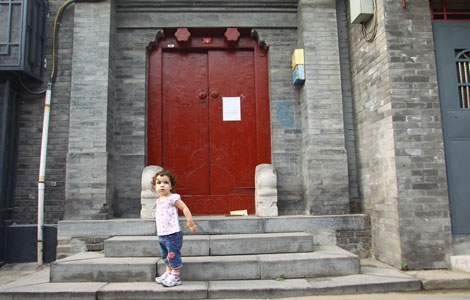The troubled 'angel'
Updated: 2013-09-11 08:13
By Wu Ni in Shanghai (China Daily)
|
||||||||
After thwarting 256 suicide attempts on the Nanjing Yangtze River Bridge in the capital of east China's Jiangsu province, "The Angel of the Bridge", is set to retire.
Chen Si, famous for his voluntary efforts to prevent people from jumping into the fast-flowing 1,500-meter-wide Yangtze River 70 meters below the bridge, will make his last patrol on Sept 19, 10 years to the day since he started his mission.
Every weekend for the past decade, Chen has patrolled the 4,000-meter-long bridge, observing pedestrians through his binoculars and following those who "plodded along and looked as though they were in a trance", prepared to grab them at the critical moment.
"However, as I got older, it became much more difficult to do the job, but I've tried my best," said Chen, who admitted that the impulse to help the desperate will never change.
The 45-year-old from Suqian in Jiangsu has high blood pressure and despite taking medicine for a year his condition hasn't improved. He also has an excessive amount of lead in his bloodstream, which doctors attribute to the exhaust fumes he's been exposed to during his vigils at the bridge.
Even the people he saved could be dangerous. "Many resisted my attempts to save them and grappled with me," he said.
"They were angry because they thought I was denying their right to die. In my condition, a careless fall on the bridge might have killed me," he added.
In August, a woman he was attempting to help struggled furiously, biting and scratching him and could only be calmed down with the help of the police.
Born into a poor family, Chen lacked educational opportunities in his youth. He grew frustrated by life's setbacks and considered suicide, but was dissuaded by an older relative, who, ironically, later killed himself because of a family dispute.
Badly shaken by the incident, Chen reasoned that if desperate people had someone to talk with, they might not want to commit suicide. He began reading books on psychology and became a volunteer watchman on the bridge, a notorious Nanjing suicide spot, where at least 2,000 people have killed themselves since it opened in 1968, according to local media reports.
But pulling people away from the edge was just the first step for Chen, who then rented a house in the suburbs, which he called "a station where the heart can rest".
"Around 90 per cent of the people I saved at the bridge refused to eat or speak, so I needed to persuade them to speak about their problems," he said.
Chen works for a logistics company and sometimes took his charges to work with him to ensure they were under adequate supervision. If their disposition improved sufficiently, he even took them back to the bridge on his patrols. If it happened that they, in turn, helped save a life, they usually changed their outlook entirely.
However, the years of lonely vigil and the things he has witnessed have also left their mark on Chen. "Try to imagine a man jumping from the bridge just five or 10 meters in front of you - that's an image one can never easily erase," he said.
"Once, when I felt on the edge of collapse, I went to a local temple to try and find some peace. I climbed the hill and walked barefoot in the grass, feeling the moisture under my feet. I let nature heal the pain," he said, although he was at pains to stress that he's not a Buddhist.
Chen's other method of relieving the pressure was to write a blog in which he noted how he rescued people.
Inspired by Chen's efforts, volunteers from universities joined him. Shen Yunling, a sophomore at Nanjing University of Technology, said: "I am touched by his persistence. Besides, I am majoring in social work and can learn a lot from this work."
Zhang Chun, director of Nanjing's Psychological Crisis Intervention Center, who has known Chen for years, described him as "a tragic hero".
"Chen is obsessed with alcohol. When he got drunk, he became talkative, but never really spoke about his pain. He tended to hide it away," said Zhang.
"He has fought alone all these years with little financial support. He said he quit the patrols because of illness, but I think he is also psychologically exhausted. He lacks the professional knowledge about psychological intervention required to drive out the negative emotions that have accumulated deep in his heart," he added.
wuni@chinadaily.com.cn
(China Daily USA 09/11/2013 page9)
Most Viewed
Editor's Picks

|

|

|

|

|

|
Today's Top News
Companies to expand in Latin America
MIT ranks world's top university, PKU 46th
China's economy stable: Davos founder
Russia proposal likely to avert US air strikes
China's Hawaii goes fishing for talent
IPO to land deals in Hollywood
Timetable not set for Six-Party Talks
Li plots the economic course ahead
US Weekly

|

|














